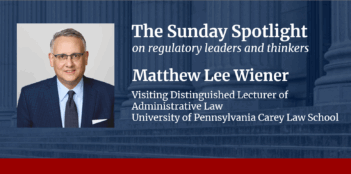
Agencies should craft rules about public access to their adjudicative proceedings.
Open legal proceedings have, for centuries, been an essential indicator of fair process in courts. Properly implemented, open proceedings can promote the interests of private parties, the government, and the public. The same holds true in administrative adjudication, as the Attorney General’s Committee on Administrative Procedure explained in 1941.
But open proceedings are not an unmitigated good in all circumstances. Besides imposing administrative costs, openness can lead to disclosure of sensitive information and allow people into the hearing room who may intimidate participants and affect their testimony.
To guide agencies in determining which of their adjudicative proceedings should be open to public observation, the Administrative Conference of the United States (ACUS) recently adopted a recommendation entitled “Public Access to Agency Adjudicative Proceedings.”
The ACUS recommendation encourages agencies to open evidentiary hearings and appellate proceedings to public observation. Nonetheless, it recognizes there can be legitimate reasons to close a proceeding. For instance, the public’s interest in an open adjudicative proceeding can be outweighed by personal privacy protections, national security interests, or confidential business information.
Agencies also conduct many other types of adjudicative proceedings, such as investigatory hearings, prehearing and scheduling conferences, and settlement conferences. Although such hearings could have public interest value, agencies often close them to public observation for various reasons. When developing a policy about public access to non-evidentiary and non-appellate agency proceedings, ACUS recommends that agencies consider how providing public access to a particular type of proceeding would promote or impede important policy objectives— such as transparency, privacy, fairness, accuracy, and efficiency.
As a practical matter, openness largely depends on how agencies facilitate public access. And so, in addition to determining which proceedings to open, agencies must consider how best to do so. ACUS encourages agencies to provide meaningful public notice of open proceedings, allow the public to observe open proceedings remotely, and consider how they make transcripts and recordings publicly available. The precise way that an agency facilitates public access will depend on the circumstances.
Finally, ACUS recommends that agencies inform the public about their policies governing public access to adjudicative proceedings. Agencies should publish procedural regulations addressing which proceedings are open and how the public can observe open proceedings. In addition, agencies should explain whether and how it provides advance public notice of proceedings and how the public can inspect or obtain transcripts and recordings of hearings. Agencies should post these regulations on their websites along with guidelines in plain language that address practical matters, such as registering to observe open proceedings, standards of conduct for public observers, and media protocols.
Crafting fair and effective policies about public access to agency adjudicative proceedings can require a careful balancing of sometimes competing interests, such as transparency and privacy. ACUS’s recommendation offers agencies a helpful starting point for doing so.
The views expressed in this essay are those of the author and do not necessarily represent the views of the Administrative Conference or the federal government.
This essay is part of a six-part series on the Administrative Conference of the United States, entitled Improving Transparency and Administrative Accountability.




